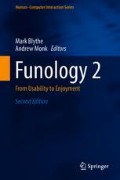Abstract
A deep shift in Western culture has occurred in the last 200 years. We have moved from lifestyles in which work, play, and other forms of experience are inextricably intertwined, to one in which most people separate their work life from a private (and often less societally valued) life of fun and play. Engineering has played a central role in this bifurcation, fulfilling a cultural desire to engineer human experience for optimal functionality.
Access this chapter
Tax calculation will be finalised at checkout
Purchases are for personal use only
References
Agre PE (1977) Computation and human experience. Cambridge UP, Cambridge
Bardzell J, Bardzell S (2008) Interaction criticism. In: CHI ‘08 Extended abstracts on human factors in computing systems (CHI EA ‘08). ACM Press, NY
Bell G, Kaye J (2002) Designing technology for domestic spaces: a kitchen manifesto. Gastronomica 2(2)
Blythe M (2004) Pastiche scenarios. Interactions 11(5):51–53
Boehner K, DePaula R, Dourish P, Sengers P (2005) Affect: from information to interaction. In: Proceedings of the 4th decennial conference on critical computing. ACM Press, NY, pp 59–68
Dourish P (2001) Where the action is. MIT Press, Cambridge
Dunne A, Raby F (2001) Design noir: the secret life of electronic objects. August/Birkhaeuser, Basel, Switzerland
Ehn P (1998) Manifesto for a digital bauhaus. Digital Creativity 9(4):207–216
Fagerberg P, Ståhl A, Höök K (2004) eMoto: emotionally engaging interaction. Pers Ubiquit Comput. 8(5):377–381
Gaver Bl, Martin H (2000) Alternatives: exploring information appliances through conceptual design proposals. In: Proceedings of the CHI 2000 conference on human factors in computing systems. ACM Press, NY, pp 209–216
McCarthy J, Wright P (2004) Technology as experience. MIT Press, Cambridge
Penny S (2000) Agents as artworks and agent design as artistic practice. In Kerstin D (ed) Human cognition and social agent technology. John Benjamins, Amsterdam
Penny S, Smith J, Sengers P, Bernhardt A, Schulte J (2001) Traces: embodied immersive interaction with semi-autonomous avatars. Convergence 7(2), Summer
Sengers P (1998) Anti-boxology: agent design in cultural context. PhD Thesis, Carnegie Mellon Department of Computer Science
Sengers P (1999) Designing comprehensible agents. In: 1999 international joint conference on artificial intelligence (IJCAI-99). Stockholm, Sweden
Sengers P (2004) The agents of McDonaldization. In: Payr S, Trappl R (ed) Agent culture. Lawrence Erlbaum Associates, pp 3–19
Sengers P, Liesendahl R, Magar W, Seibert C, Müller B, Joachims T, Geng W, Mårtensson P, Höök K (2002) The enigmatics of affect. In: 2002 conference on designing interactive systems. ACM Press, NY
Sengers P, Boehner K, David S, Kaye J (2005) Reflective design. In: Proceedings of the 4th decennial conference on Critical computing. ACM Press, NY, pp 49–58
Strasser S (1982) Never done; a history of american housework. Pantheon Books, NY
Taylor A, Swan L (2005) Artful systems in the home. In Proceedings of the SIGCHI conference on human factors in computing systems (CHI ‘05). ACM Press, NY, pp 641–650
Williams K (2015) An anxious alliance. In: Proceedings of the fifth decennial aarhus conference on critical alternatives. Aarhus University Press, pp 121–131
Wilson S (2002) Information arts: intersections of art, science and technology. MIT Press, Cambridge, MA
Winograd T, Flores F (1986) Understanding computers and cognition. Ablex, Norwood, NJ
Acknowledgements
The Industrial Graveyard was supported in part by an ONR Allen Newell Fellowship. My work on Traces was supported by a Fulbright fellowship. The Influencing Machine is part of the EU SAFIRA project. The systems described here were built at Carnegie Mellon University, the Center for Art and Media Technology (ZKM), at the German National Information Technology Research Center (GMD), and Cornell University.
Author information
Authors and Affiliations
Corresponding author
Editor information
Editors and Affiliations
Rights and permissions
Copyright information
© 2018 Springer International Publishing AG, part of Springer Nature
About this chapter
Cite this chapter
Sengers, P. (2018). The Engineering of Experience. In: Blythe, M., Monk, A. (eds) Funology 2. Human–Computer Interaction Series. Springer, Cham. https://doi.org/10.1007/978-3-319-68213-6_18
Download citation
DOI: https://doi.org/10.1007/978-3-319-68213-6_18
Published:
Publisher Name: Springer, Cham
Print ISBN: 978-3-319-68212-9
Online ISBN: 978-3-319-68213-6
eBook Packages: Computer ScienceComputer Science (R0)

